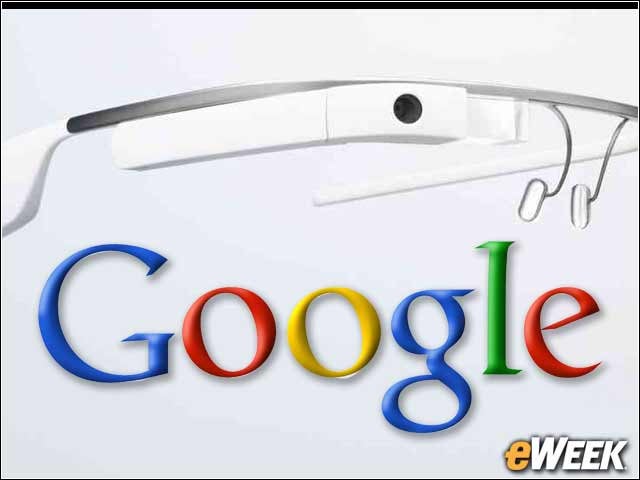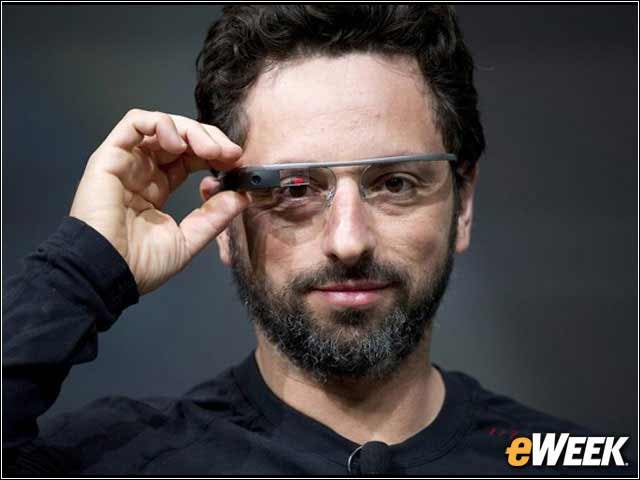eWEEK content and product recommendations are editorially independent. We may make money when you click on links to our partners. Learn More.
2The Next Google Glass Is About the Enterprise First and Foremost
The new Google Glass will appeal first to the enterprise, according to reports. In fact, the device currently in development is labeled with an “EE” tag, meaning Enterprise Edition. Several recent analyst reports have suggested that the enterprise could be a profoundly appealing home for smart eyewear, and it appears Google believes the same.
3All Google Apps, All the Time
The second version of Google Glass won’t shed one important feature from the past: its deep integration with Google applications. Chances are, everything from Google Now to Google Maps and Google Search will be bundled with Glass to ensure people who are wearing the device are actively using the company’s online services.
4A Surprisingly Long List of Enterprise Apps
The list of enterprise apps available to Google Glass could be quite long. According to reports, Google has secretly kept its app-development program for Glass in place, despite taking the device off store shelves. The search giant has been specifically focusing on attracting enterprise developers. So, there’s a significant chance that Google Glass 2.0 will support several enterprise apps out of the box.
5A Modified Design
The Google Glass design has been a subject of much debate over the years. Some found the device’s monocle-like design to work fine, while others found it overly “geeky.” Either way, Google reportedly is working on a refined design that will make it not only more comfortable, but also more appealing to people who want the tech features without feeling too “techy.”
6A Simple but Important Addition: External Battery Pack
This may sound like a small feature, but it’s actually a huge one: Google is reportedly planning to include support for an external battery pack with Glass 2.0. One of the big issues with the first Google Glass was that it didn’t have all-day battery life, making it rather unusable for many companies. While Glass 2.0 still won’t have all-day battery life, it will be able to get juice from an external pack that will give it the extra time it needs to last the workday. For enterprise customers, especially, that’s a huge plus.
7Larger Display Prism for Viewability
According to reports, Google Glass will come with a broader “display prism.” What that means is people will be able to look up and around Glass more easily. The previous model required more eye movements, causing some to complain of eyestrain. A larger display prism is a critical component in getting Glass accepted more broadly.
8Full WiFi Support and Bluetooth
The FCC may have accidentally leaked details on Glass 2.0 recently after approving a Google device that would include support for 802.11n wireless networking, as well as Bluetooth. That means Glass will work autonomously (unlike most other wearables) and will be a fully wireless experience out of the box. It’s a bit expected from eyewear, but an important note, nonetheless.
9Intel Will Be Inside
So, what will power Glass 2.0? The latest rumors say that Google has decided to go with an Intel Atom processor because of its solid power capabilities and battery handling. While the Intel Atom won’t save enough power for Glass’ battery to last all day, it will at least improve it. If Glass takes off, Intel’s mobile chipset division will get a much-needed boost, thanks to Google’s wearable.
10Don’t Forget About the Consumers
All of this talk has centered on the enterprise, but Glass 2.0 won’t just appeal to the corporate world. Consumers are expected to have an option that comes with all the bells and whistles mentioned here, but perhaps with some other important specs. Rumors on a consumer edition are a little thin, but expect Google to hit both markets—the enterprise and consumer space—with Glass 2.0.
11A Late-2015 Launch, Perhaps?
Speculation abounds over when the new version of Google Glass will actually launch, but the latest reports say it’ll happen at some point in late 2015. Those claims may carry some weight when one considers that Google is actively wooing developers and may have already received FCC approval. A late-2015 relaunch for Google Glass seems like a plausible timeframe for what could be an important product from Google.










